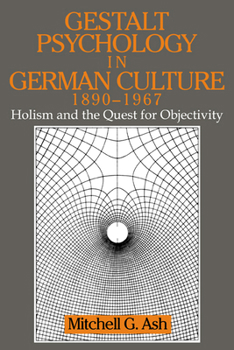Gestalt Psychology in German Culture, 1890-1967: Holism and the Quest for Objectivity
Select Format
Select Condition 
Book Overview
This is a full-length historical study of Gestalt psychology - an attempt to advance holistic thought within natural science. Holistic thought is often portrayed as a woolly-minded revolt against reason and modern science, but this is not so. On the basis of rigorous experimental research and scientific argument as well as on philosophical grounds, the Gestalt theorists Max Wertheimer, Wolfgang Kohler and Kurt Koffka opposed conceptions of science...
Format:Paperback
Language:English
ISBN:0521646278
ISBN13:9780521646277
Release Date:October 1998
Publisher:Cambridge University Press
Length:528 Pages
Weight:1.55 lbs.
Dimensions:1.0" x 6.0" x 9.0"
Customer Reviews
2 ratings
A difficult mountain to climb and not many blossoming trees
Published by Thriftbooks.com User , 16 years ago
The book may become indispensable in getting to understand Gestalt Psychology but it is a tough wack to get through for the lay reader. I found many interesting, enlightening and thought provoking comments but also much that is long winded and painfully obscure. I had to read the book to get to grips with this serrendipitus subject which might, after all just be an idealist projection of the unconscious Mother symbol on a reality that only works under Paternal authority and "Justice". In other words a comforting world view in what is really an inhospitable universe.
The Origins of Gestalt Theory
Published by Thriftbooks.com User , 25 years ago
Gestalt psychology was founded by three German psychologists (Max Wertheimer, Kurt Koffka, and Wolfgang Kohler) in 1910 in Frankfort. Reestablished after World War I at the University of Berlin, it flourished from the 1930s into the 1960s, then faded as its leaders aged and its major findings were absorbed by mainstream psychology. Today, the only surviving Berlin-trained gestaltist is the 95-year-old art theorist Rudolf Arnheim (author of Art and Visual Perception: A Psychology of the Creative Eye), who is still actively writing. Gestalt theory was and is important to different people for different reasons. In German, the word for "design" is gestalt, and one reason for its appeal to artists, architects, and graphic designers is that it provides scientific validation of age-old esthetic principles. For those who have gained from gestalt theory, whether artists, scientists, or psychologists, this is an invaluable, interesting book. As the first comprehensive history of the movement, it covers a wide range of material, beginning at the turn of the century with Carl Stumpf, Christian von Ehrenfels, and others who set the stage; moving on to the Berlin Psychological Institute, and the numerous teachers and students who left before and during World War II; and concluding in the 1960s, when Germany was still divided, with the fate of the few who preferred to remain. (Copyright by Roy R. Behrens from Ballast Quarterly Review, Vol. 14, No. 4, Summer 1999.)






